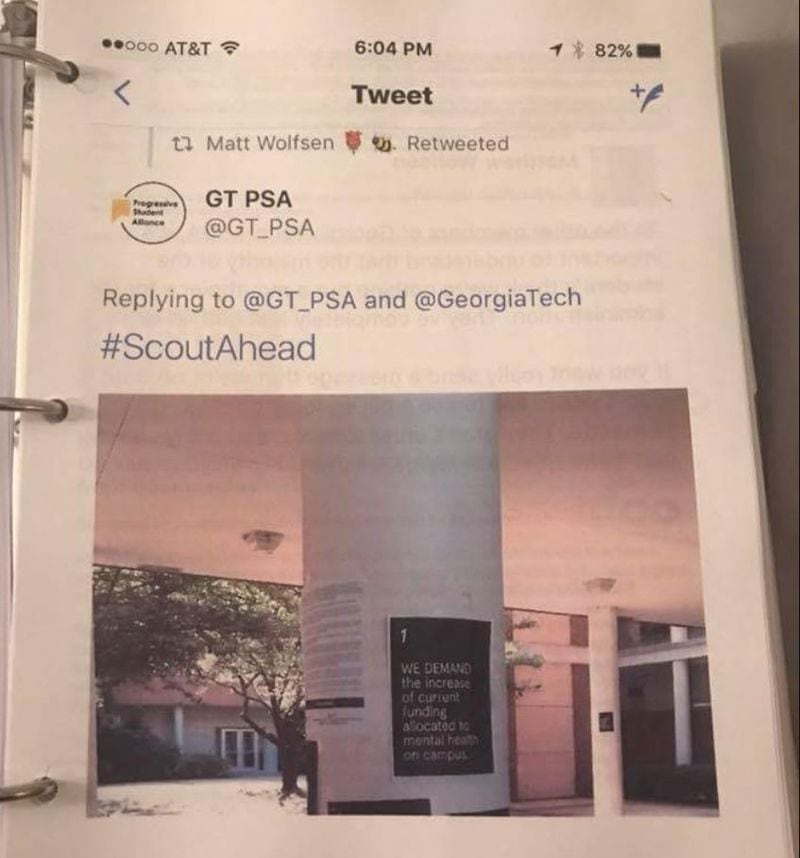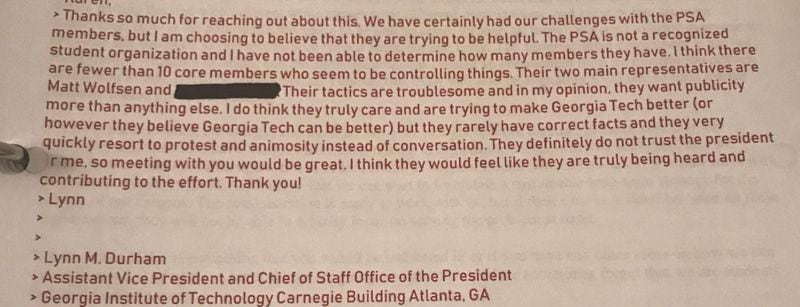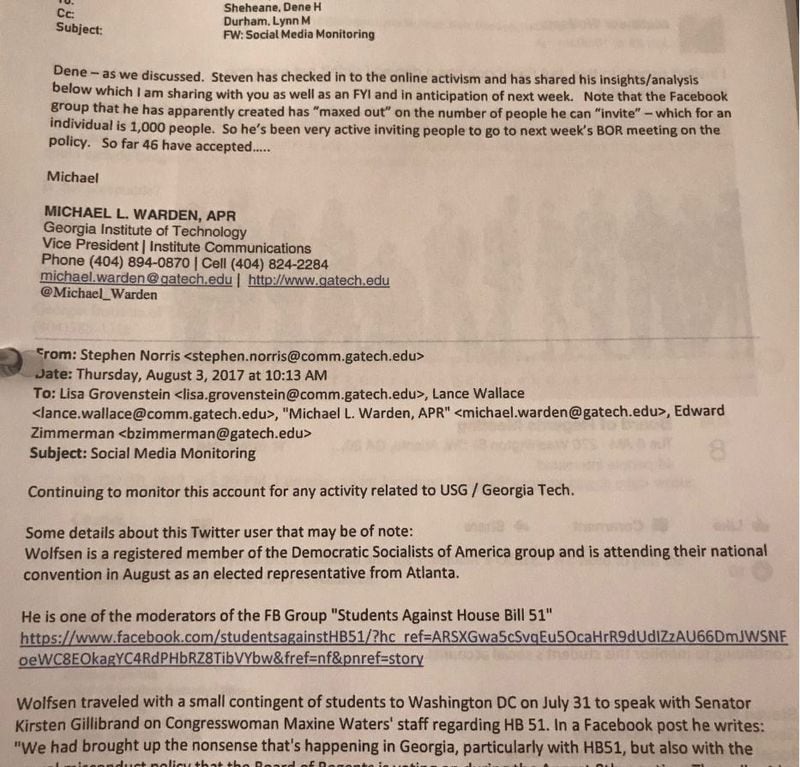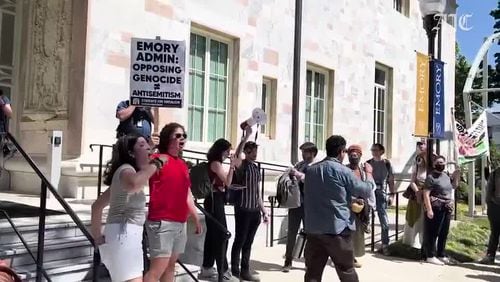Matt Wolfsen was a high school junior in 2012 when a fired teacher stormed into his private high school in Jacksonville, Fla., and shot the headmistress to death and killed himself. In the building when the shooting occurred, Wolfsen said he realized he had to look up from his calculus and become more politically active.
He kept that pledge at Georgia Tech where he studies chemical engineering. Tech appeared to value Wolfsen's leadership on social justice causes, including the protection of victims of campus sexual assault. Wolfsen chaired the student government association’s sexual violence advisory board from May through November. The Office of Government and Community Relations reached out to collaborate with him.
However, the collegiality faltered over the course of the battle this year around House Bill 51, legislation in the Georgia General Assembly to restrict the ability of public colleges to independently investigate and punish rapes on campus. The bill was sponsored by a frequent and influential critic of Georgia Tech, state Rep. Earl Ehrhart. The bill passed the House but failed to make it out of the Senate.
The Office of Institute Communications at Tech tracked Wolfsen's social media postings related to the issue, emailing some of the information to administrators. The scrutiny continued after the death of Scout Schultz, a fellow activist on campus. Even Wolfsen's tweet of a campus sign calling for more mental health services was recorded and passed on to the president's office.
Credit: Maureen Downey
Credit: Maureen Downey
Wolfsen discovered the internal emails about him through the Family Educational Rights and Privacy Act (FERPA), which entitles students to their records including emails about them.
In response to his FERPA request, Wolfsen received two binders of records from Tech, which he showed me in a coffee shop near campus. He phrased his FERPA request to get all emails included with routine student records. The binders contain several responses from Tech where it appears the university attorney wanted Wolfsen to narrow the request, perhaps so the emails would be exempted.
"My first reaction in seeing all this was wow," said Wolfsen. "This is what happens to a student who gets involved? Is this Ok? Is this legal? What else have they been tracking about me? Are they tracking other students?"
Yes, says Georgia Tech, because social media represents the communications channel of choice for students and student leaders, and it's now common for colleges to keep tabs online activity involving their campuses. In response to questions, Tech sent this statement: "This is a routine practice among our peers in higher education, as well as organizations and corporations with large social media programs. It is a tool for Georgia Tech community members to share pride and encouragement as well as a method to offer suggestions for change and improvement."
The emails suggest a wariness after Wolfsen was interviewed by the AJC and a local TV station and won an audience in Washington with Candice Jackson, who leads the U.S. Department of Education’s Office for Civil Rights. An email from the Tech president's chief of staff suggested Wolfsen "wanted publicity more than anything else." (For the record, the AJC reached out to Wolfsen for its news story; he did not contact us. Nor did Wolfsen contact me about this story; a University of Georgia journalism major alerted me and I called Wolfsen.)
Credit: Maureen Downey
Credit: Maureen Downey
In its statement, Tech said, "The Institute noticed the posts Matt Wolfsen shared on his public social media accounts in which he either tagged or mentioned Georgia Tech. Georgia Tech supports and encourages students to be engaged in their community. This includes sharing their opinion on social media and in person on campus.”
Tech failed to address why a staff member would feel compelled to share Wolfsen's political affiliation, as shown in this email.
Credit: Maureen Downey
Credit: Maureen Downey
Is such scrutiny of student advocacy on social media as common as Tech contends?
"That level of attention is unusual. There's an important difference between listening to student concerns and monitoring student activists" said Adam B. Steinbaugh of the Foundation for Individual Rights in Education "It's one thing to listen to students when they make their views known to you; it's another thing to eavesdrop."
What Tech was doing was not illegal as Wolfsen's social media postings were public. But monitoring can intimidate students into silence, said attorney Lisa Anderson, executive director of Atlanta Women for Equality. She worked alongside Wolfsen in opposition to Ehrhart's campus assault legislation.
"I would hope the school would encourage its students to be involved in the public dialogue. It is not good for Tech to discourage people from making a difference and speaking up. Matt’s causes are nonviolent. He is working for peace and to protect people," said Anderson. "If you know there is an attitude of hostility toward students exercising their rights, that is going to be a huge obstacle."
Wolfsen is still shaken by what the binders revealed, saying, "I would still like to hear why they felt it was necessary to spend tax dollars to track a student getting involved in these issues. At the end of the day, I get that they recognized what I was doing was somewhat influential, but there are better ways to go about it than to track me on Twitter and Facebook. My doors are open; they can meet with me."
I asked Tech about paying employees to track student comments."This represents a small part of the social media staff's responsibilities, which also includes producing video and writing stories that showcase Georgia Tech students, research, campus and our impact on the state," said the statement.
Students with whom Wolfsen shared these emails were dismayed. "Do students really want to speak out about their beliefs now? That is a valid question," he said.
Electrical engineer and campus leader Anna Harrison graduates Georgia Tech today. "It seems there are better places to use that money than in surveying students. It doesn't matter what Matt's political affiliations are. What should matter is that he is a student and his voice should matter to the school," she said.
Harrison believes Georgia Tech became more concerned with its reputation after a campus police officer shot and killed student Scout Schultz on Sept. 16. Schultz called 911 warning of a man armed with a knife and, possibly, a gun. Schultz, who left behind three suicide notes, was carrying a utility tool with the blade not extended. Police ordered the 21-year-old computer engineering student to drop the knife but Schultz didn’t comply.
"Those few vocal individuals on campus who aren't willing to sweep things under the rug end up being watched by the school. Overall, there has been a silencing effect, especially after Scout's death," she said. "A lot of students are really afraid to speak out."
About the Author










